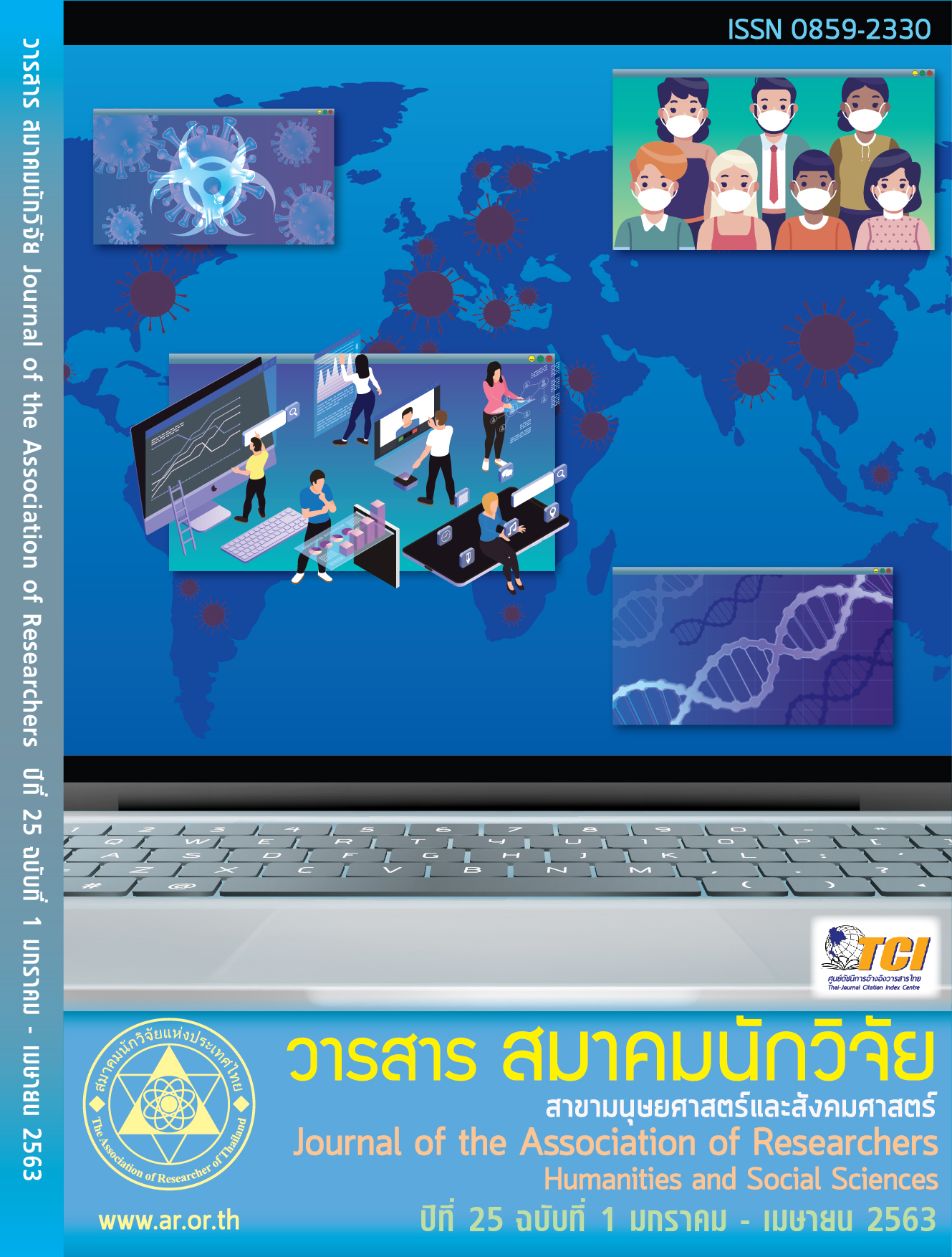The Effects of Passenger Engagement and Its Antecedents on Repurchase Intention for Low-Cost Carriers of Thailand.
Main Article Content
Abstract
In this research studies the effects of antecedents on passenger satisfaction, passenger engagement with low-cost carriers and repurchase intention, and the effects of passenger engagement with low-cost carriers on repurchase intention. In this mixed-methods research investigation, the researcher conducted in-depth interviews prior to the construction of a research conceptual framework and after the analysis of quantitative data for the sake of confirming results. A questionnaire was used as a research instrument for collecting quantitative data. The sample population consisted of 1,293 passengers of low-cost carriers in the Kingdom of Thailand (Thailand).
Findings are as follows:
- The reputation of carriers and service quality exerted positive effects on passenger satisfaction.
- The reputation of carriers, service quality, and passenger satisfaction exerted positive effects on passenger engagement.
- The reputation of carriers, service quality, and passenger engagement exerted positive effects on repurchase intention.
- Passenger satisfaction had no effects on repurchase intention.Findings showed that passenger engagement was an important variable that had effects on increases in the repurchase intention of passengers in the context of low cost carriers in Thailand.
Article Details
บทความที่ปรากฏในวารสารนี้ เป็นความรับผิดชอบของผู้เขียน ซึ่งสมาคมนักวิจัยไม่จำเป็นต้องเห็นด้วยเสมอไป การนำเสนอผลงานวิจัยและบทความในวารสารนี้ไปเผยแพร่สามารถกระทำได้ โดยระบุแหล่งอ้างอิงจาก "วารสารสมาคมนักวิจัย"
References
South East Asia Journal of Contemporary Business. Economics and Law, 2(6), 34-40.
Aviation Business Research and Development Bureau. (2018).
Thailand Aviation Industrial Report. December 2018. Civil Aviation Training Center.
Badawi., Tjahjono H.K., & Muafi. (2017). The role of corporate reputation
moderation of banking services. Polish Journal of Managements Studies, 15(1), 15-25.
Beer, M., & Russell, E. (1996). Developing an organization capable
of implementing strategy and learning. Human Relations, 49(5).
Chen, C. M., & Liu, H. M. (2017). Exploring the impact of airlines service quality
on customer loyalty: Evidence from Taiwan. International Journal of Business
and Management, 12(5), 36-50.
Choe, P., & Zhao, Y. (2013). The influence of airline brand on purchase intention
of air tickets in China. Industrial Engineering & Management Systems, 12(2), 143-150.
Clemes, M. D., Gan, C., Kao, T. H., & Choong, M. (2008). An empirical analysis
of customer satisfaction in international air travel. Innovative Marketing, 4(2), 49-62.
Doney, P., & Cannon, J. (1997). An examination of the nature of trust in buyer-seller
relationships. Journal of Marketing, 61(2), 35-51.
Ed O’Boyle. (2009). B2B customers have feelings too. Business Journal.
Graham, M. E., & Bansal, P. (2007). Consumers’ willingness to pay for corporate
reputation: The context of airline companies. Corporate Reputation Review, 10(3), 189-200.
Hair, J., Black, W., Babin, B., Anderson, R. & Tatham, R. (2010).
Multivariate data analysis (7th ed.). Upper Saddle River, NJ: Pearson Education.
Hapsari, R., Clemes, M., & Dean, D. (2017). The impact of service quality,
customer engagement and selected marketing constructs on airline passenger
loyalty. International Journal of Quality and Service Science, 9(1), 21-40.
Hendrikus, K., & Inda, S. (2017). A study of service quality: An empirical
investigation of Indonesian airline services. South East Asian Journal of
Contemporary Business, Economics and Law, 1, 101-107.
Kotler, P., & Armstrong, A. (2004). Principle of marketing. NJ: Prentice-Hall.
Krittipat Pitchayadejanant & Parinya Nakpathom. (2016). The effect of
demographic information as moderator toward relationship between
service quality, customer satisfaction, and customer loyalty in Thai low
cost carriers’ passengers. Journal of Marketing Management, 4(1), 172-182.
Mahmud, A., Jusoff, K., & Hadijah, St. (2013). The effect of service
quality and price on satisfaction and loyalty of customer of
commercial flight service industry. World Applied Sciences
Journal, 23(3), 354-359.
Pannathadh Chomchark. (2018). A comparison of the
structural relations of marketing mix, satisfaction,
engagement and decisions on products & services mobile
phone networking. Journal of the Association Researchers, 23(1), 89-102.
Parasuraman, A., Zeithaml, V.A., & Berry, L. L. (1988). SERVQUAL:
A multiple-item scale for measuring consumer perceptions
of service quality. Journal of Retailing, (spring), 12-40
Park, E., Lee, S., Jib Kwon, S., & Angel P, D. (2015). Determinants
of behavioral intention to use South Korean airline services: Effects
of service quality and corporate social responsibility. Sustainability, 7, 12106-12121.
Rahayu, S. E. Akt. (2015). The influence of service quality,
trust and brand image toward customer satisfaction and
its impact to brand loyalty. International Journal of
Advanced Research, 3(10), 1867-1873.
Sandada, M., & Matibiri, B. (2016). An investigation into
the impact of service quality, frequent flier programs and
safety perception on satisfaction and customer loyalty in the
airline industry in Southern Africa. South East European
Journal of Economics and Business, 11(1), 41-53.
Sheng Yen Lee. (2017). Service quality of sports centers and
customer loyalty. Asia Pacific Journal of Marketing and
Logistics, 29(4), 870-879.
Singh, A. K. (2015). Modeling passengers’ future
behavioral intentions in airline industry using SEM.
Journal of Advances in Management Research, 12(2), 107-127.
Thapanat Buaphiban. (2015). Determination of factors that influence
passengers’ airline selection: A study of low cost carriers in Thailand.
Unpublish doctoral dissertations. Embry-Riddle Aeronautical University
Daytona Beach, Florida.
Wahab, Z., Sukati, I., & Li, L. H. (2015). Measuring the Malindo
airline passenger’s satisfaction. Asian Social Science, 11(18), 233-245.
Weerawit Lerrthaitrakul & Vinai Panjakajornsak. (2014). The airline
service quality affecting post purchase behavioral intention: Empirical
evidence from the low cost airline industry. International Journal of Trade,
Economics and Finance, 5(2), 155-158.
Xiaochen, Z., & Phanasan Kohsuwan. (2016). Factors influencing
purchase intention toward low-cost carriers: The case of Chinese
in-bound passengers to Thailand. Catalyst, 13(2), 67-79.
Yasintha, S. (2015). How service quality, fares, repeat purchase
and loyalty create word of mouth at a passengers low cost airlines
in Indonesia. JABER, 13(7), 6053-6065.
Zeithaml, V. A., Parasuraman, A., & Berry, L. L. (1990). Delivering
quality service: Balancing customer perceptions and expectations.
New York: The Free Press.


